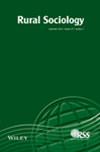参与生物多样性:农民与更广泛的社区不同吗?
IF 1.9
3区 社会学
Q2 SOCIOLOGY
引用次数: 0
摘要
农业对环境的破坏性影响日益导致城市社区和农民之间的冲突。这种冲突能在多大程度上得到解决,部分取决于农民和更广泛的社区对环境的关注程度是否不同。我们衡量了新西兰农民和更广泛的社区对生物多样性的参与。我们还调查了农民和更广泛的社区在参与前事方面的差异,例如他们在保护生物多样性方面的参与和目标意图。我们发现农民和更广泛的社区在参与、认知参与和情感参与保护生物多样性方面是相似的。两者对保护生物多样性的态度和目标意图相似,但在行为投入和对生物多样性的行为上存在差异。我们发现,与更广泛的社区相比,农民的行为参与度更高(而不是更低)。我们的结论是,农民和更广泛的社区在保护生物多样性的行为参与方面的差异是与这种行为相关的机会和机会成本差异的产物。这对更广泛的社区对农民动机的看法以及从环境角度判断什么是“良好”的农业实践具有影响。本文章由计算机程序翻译,如有差异,请以英文原文为准。
Engagement With Biodiversity: Are Farmers Different From the Wider Community?
The damaging effects agriculture has on the environment have resulted, increasingly, in conflict between the urban community and farmers. The extent to which this conflict might be resolved depends, in part, on whether farmers and the wider community differ in their degree of concern for the environment. We measured the engagement of farmers and the wider community with biodiversity in New Zealand. We also investigated differences among farmers and the wider community in the antecedents of engagement, such as their involvement and goal intentions with respect to conserving biodiversity. We found that farmers and the wider community were similar in their involvement, cognitive engagement, and affective engagement with conserving biodiversity. Both had similar attitudes towards, and goal intentions regarding, conserving biodiversity, but they differed in their behavioral engagement, their behavior towards biodiversity. We found that farmers were more (not less) behaviorally engaged than the wider community. We concluded that the difference between farmers and the wider community in their behavioral engagement with protecting biodiversity was the product of differences in opportunities and opportunity costs related to such behavior. This has implications for the wider community's perception of farmers' motivations and its judgments about what constitutes “good” farming practice from an environmental perspective.
求助全文
通过发布文献求助,成功后即可免费获取论文全文。
去求助
来源期刊

RURAL SOCIOLOGY
SOCIOLOGY-
CiteScore
4.60
自引率
13.00%
发文量
47
期刊介绍:
A forum for cutting-edge research, Rural Sociology explores sociological and interdisciplinary approaches to emerging social issues and new approaches to recurring social issues affecting rural people and places. The journal is particularly interested in advancing sociological theory and welcomes the use of a wide range of social science methodologies. Manuscripts that use a sociological perspective to address the effects of local and global systems on rural people and places, rural community revitalization, rural demographic changes, rural poverty, natural resource allocations, the environment, food and agricultural systems, and related topics from all regions of the world are welcome. Rural Sociology also accepts papers that significantly advance the measurement of key sociological concepts or provide well-documented critical analysis of one or more theories as these measures and analyses are related to rural sociology.
 求助内容:
求助内容: 应助结果提醒方式:
应助结果提醒方式:


